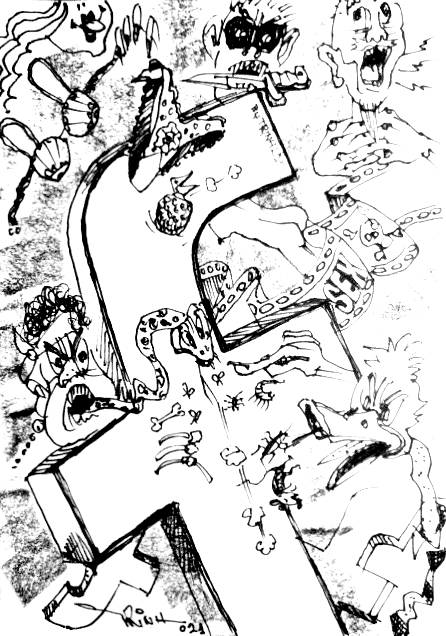Bảo Ngọc
I got my first Facebook account in 2011, but only used it for farm games.
It wasn't until 2 years later that I really understood what social media was and started spending hours sending friend requests to almost everyone I knew in the world, including relatives, classmates, and even celebrities.

Illustration by Trịnh Lập
At that time, Facebook felt like a great tool for me to freely express myself.
I posted pictures of food, did silly Facebook challenges, tagged 15 friends in a Buddha photo for luck and made friends with all the cool kids in school -- people I never thought I would dare to talk to in real life.
Later, when I entered university, Facebook became a place for me to join class groups, search for course information and talk to lecturers.
As someone fond of writing, I started sharing opinions and personal perspectives on Facebook. From a few likes from friends, my posts got more attention every day and soon reached thousands of likes and shares from the community.
During university, thanks to Facebook, one of my articles caught the eye of an editor and I immediately got my first job in the press.
The joy of seeing my own articles receive many likes, shares and comments becomes the motivation for me to continue writing. Getting attentions on Facebook turned into my pride but also the reason for all my troubles.
I started comparing article interaction with colleagues and felt that I was defined by the number of likes I received. If the article had few likes, it meant it had no value.
If one day my post did not get as many comments as my peers, it meant I was an incompetent person. Low self-esteem gently whispered such things into my ear. And then I would start to think of ways to get more likes.
I would write untrue things to build a “virtual” personality on social networks. Through such articles, I would define myself as “not like the other girls”, that I was funny, strong and always looked at the world with a unique lens. But it was just to get more attention on Facebook.
Gradually, my virtual personality had deceived everyone, including myself. There’s no doubt that Facebook contributed to this.
I forgot who I was. Frequent fatigue and depression caused me to undergo psychological treatment. I finally chose to no longer post anything on my personal page and ultimately choose to deactivate my Facebook account as a way to escape this ‘reality’.
These days, Facebook is facing its biggest ever crisis with accusations from whistleblower Frances Haugen, including putting profits before users, harming children and weakening democracy.
Despite supposed efforts to promote information safety features, the “soft borders” of Facebook seem unable to prevent the harmful effects of hate speech, violence and misinformation.
According to NapoleonCat (a tool to measure social network indicators), by June 2021 the total number of Facebook users in Việt Nam hit nearly 76 million people, accounting for more than 70 per cent of the national population, an increase of 31 million users compared to 2019 and leading the list of popular social networks in Việt Nam.
Launched at the same time as smartphones and wireless networks, while constantly being upgraded, Facebook seemed to open up a new yet addictive world to the public.
Vietnamese people know too well why Facebook dominates their time online. In this country, almost any activity can be performed on Facebook. People communicate, do online learning, connect with friends, share their personal life, and even open business models by accessing its large customer base.
However, the smart experiences brought by Facebook are proportional to the amount of information that users share, which includes financial information, location, shopping habits, food preferences, relationship statuses and more. If such personal data is stolen, users will face many risks.
We all know the dark side of Facebook. Most of us have tried to uninstall the app to escape its negative effects. We usually fail.
Deleting your Facebook account is like disappearing from this world in some ways. If you were to delete Facebook, you risk losing touch with those who you don't have a strong offline relationship with.
It's far easier to stay in touch with colleagues by searching for them on Facebook and seeing what they're up to than to pick up the phone, especially if you don't want to talk to them directly or if they speak a different language to you.
Then there are people in your life that you don't communicate with very often but still want to keep in touch with, such as old classmates or relatives living far away. If you deactivate your account, you risk losing touch with a lot of people forever, or you'll have to find other ways to communicate with them.
I never thought I could quit Facebook. Working as a journalist requires me to be constantly updated with the latest news, communicate with colleagues on a daily basis, and Facebook is the fastest and most effective tool to do so. This is the problem for many people — it’s tied to their college classes or they have a page they have to manage for their job.
Going beyond the boundaries of a virtual world, Facebook or any other social network claims to make people's lives richer and happier through digital experiences, but such networks are beneficial or harmful depending on perception and the exploitation of each individual and organization.
Knives are very dangerous but every home has at least one and uses it every day. Now, more than ever, the question remains: how much should we use Facebook, and how much does Facebook use us? VNS
OVietnam